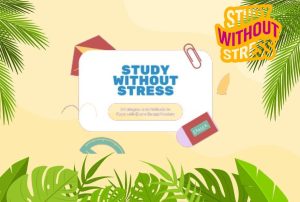Study Without Stress
Studying without stress is more than just a catchy phrase; it is a healthy and achievable approach to education that helps students learn effectively without being overwhelmed. Many learners feel trapped in anxiety whenever exams or assignments approach, but real success lies in building a balanced routine that prioritizes focus, clarity, and emotional stability. Whether you are a high school student, a university scholar, or even a lifelong learner, mastering the art of calm learning can transform not only grades but also your overall well-being.

Understanding Stress in Education
Stress in academics usually comes from three main sources: lack of time, lack of organization, and fear of failure. Students often try to memorize everything in one sitting or push themselves with late-night cramming sessions. This approach creates mental fatigue and lowers performance. Choosing to study without stress begins with recognizing these harmful patterns and replacing them with healthier practices.
The Role of Daily Planning
One of the most effective ways to reduce anxiety is through a daily study plan. Instead of leaving preparation for the last moment, students should create a timetable that spreads tasks across the week. A consistent routine helps the brain know what to expect, reducing uncertainty.
-
Divide tasks into small, achievable goals.
-
Schedule breaks to recharge mental energy.
-
Avoid multitasking, which increases stress levels.
When learners stick to a manageable schedule, they not only finish more work but also gain the confidence needed to study without stress.
Building a Positive Learning Environment
The environment in which you study influences concentration and mood. A cluttered desk, loud background noises, or constant phone notifications are common distractions. Creating a calm environment helps in smooth learning.
-
A clean, well-lit study space improves focus.
-
Background music without lyrics can boost productivity.
-
Digital distractions should be minimized by turning off notifications.
When the environment feels peaceful, the brain enters a state of natural focus, allowing students to engage deeply and study without stress.

Power of Relaxation Techniques
Relaxation is not wasted time; it is an investment in better focus. Techniques such as meditation, breathing exercises, or light yoga have been scientifically proven to lower anxiety levels. Just 10 minutes of mindfulness practice before study sessions can reset the brain and enhance retention.
Breathing deeply slows down the nervous system, signaling the body that there is no danger. This prepares the mind to absorb knowledge calmly. By practicing these habits consistently, students can manage pressure and truly study without stress.
Nutrition and Sleep for Mental Clarity
A healthy mind needs proper fuel. Junk food and excessive caffeine may give short-term energy but often lead to fatigue and poor concentration. Eating brain-friendly foods like nuts, fruits, and leafy greens supports long-term focus.
Equally important is sleep. Research shows that a lack of sleep weakens memory consolidation. Students who sacrifice rest for late-night cramming often end up performing worse. Prioritizing sleep is one of the simplest ways to study without stress because a rested brain can think clearly and recall information faster.
Active Learning Strategies
Passive reading or memorizing is one of the main reasons students feel stressed. The brain gets tired when it cannot connect ideas meaningfully. Active learning, on the other hand, makes study sessions more engaging and efficient.
Examples of active learning include:
-
Teaching a concept to someone else.
-
Using flashcards for quick recall.
-
Breaking down topics into mind maps.
-
Practicing past papers instead of endless note-taking.

When learners adopt active strategies, they achieve more in less time, which naturally helps them study without stress.
Emotional Balance and Self-Motivation
Academic pressure is not just about the workload; it’s also about the emotional state of the student. Comparing yourself to others, fearing judgment, or doubting your ability adds unnecessary stress. To combat this, self-motivation and positive affirmations play a vital role.
-
Celebrate small victories instead of only chasing big results.
-
Remind yourself that mistakes are opportunities to learn.
-
Stay connected with supportive friends or mentors.
Developing emotional strength allows learners to stay calm, which directly supports their goal to study without stress.
Importance of Breaks and Hobbies
Non-stop studying is counterproductive. The human brain works best with cycles of focus and relaxation. The famous Pomodoro Technique—25 minutes of study followed by a 5-minute break—is effective for maintaining energy.
Engaging in hobbies such as drawing, sports, or music also refreshes the mind. These activities provide balance, prevent burnout, and build creativity. Students who allow time for hobbies return to their books with higher energy and study without stress more effectively.
A Tool or a Trap
Digital tools can be both helpful and harmful. On one hand, apps that track study time, offer flashcards, or provide guided meditation can reduce anxiety. On the other hand, constant social media notifications can derail focus.
The key is to use technology mindfully. Educational apps should serve learning goals, while distractions must be controlled. This digital discipline ensures that learners remain on track and continue to study without stress.

Final Thoughts
At its core, the ability to study without stress is not about working less but about working smarter. By planning daily tasks, creating a positive environment, eating well, resting enough, and practicing active learning, students can achieve better results with less anxiety. Stress-free learning is a lifestyle choice that nurtures both the mind and the body.
Education should never be a source of constant fear. Instead, it should be a journey of discovery and growth. When students apply calm learning strategies, they not only score higher but also build resilience, confidence, and joy in the process.
The path to success is not paved with sleepless nights and endless pressure—it is built on balance, discipline, and mindful practices. By adopting these methods, anyone can unlock their potential and truly study without stress.
